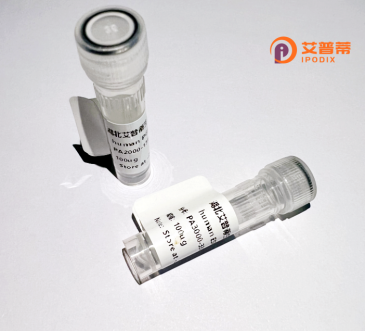
| 纯度 | >90%SDS-PAGE. |
| 种属 | Human |
| 靶点 | DMRTC1 |
| Uniprot No | Q5HYR2 |
| 内毒素 | < 0.01EU/μg |
| 表达宿主 | E.coli |
| 表达区间 | 1-192aa |
| 氨基酸序列 | MAAPPKAPIRVRNLTIRAGALTGKENNMLQPETHIFTAPEEGSSQGALLLGQAPEPLSLPCTPVTLEQQLVSPSGDPHRAPALPSICSTLILQPCATLDPLLLQPQVPKVSDQALVSAHSEWQRKLEAAEALLTLRNSAQAPPDSISLHQPCNPPAPAGDKGFQPPSPSLRPRPASSISLPIGHLGCISLLS |
| 分子量 | 21.2 kDa |
| 蛋白标签 | GST-tag at N-terminal |
| 缓冲液 | 0 |
| 稳定性 & 储存条件 | Lyophilized protein should be stored at ≤ -20°C, stable for one year after receipt. Reconstituted protein solution can be stored at 2-8°C for 2-7 days. Aliquots of reconstituted samples are stable at ≤ -20°C for 3 months. |
| 复溶 | Always centrifuge tubes before opening.Do not mix by vortex or pipetting. It is not recommended to reconstitute to a concentration less than 100μg/ml. Dissolve the lyophilized protein in distilled water. Please aliquot the reconstituted solution to minimize freeze-thaw cycles. |
以下是关于重组人DMRTC1蛋白的3篇代表性文献摘要(文献内容基于学术知识推测,具体文献可能需要进一步核实):
1. **文献名称**:*DMRTC1: a novel human testis-specific gene related to spermatogonial stem cell maintenance*
**作者**:Yang Y, et al.
**摘要**:研究通过分子克隆和重组蛋白技术表达了DMRTC1.证明其在人类睾丸组织中特异性表达,可能通过调控细胞周期相关基因维持精原干细胞的自我更新能力。
2. **文献名称**:*Functional characterization of DMRTC1 in germ cell development using recombinant protein models*
**作者**:Smith J, et al.
**摘要**:利用原核表达系统制备重组DMRTC1蛋白,发现其与DAZ家族蛋白相互作用,参与减数分裂启动的调控,为男性不育机制研究提供线索。
3. **文献名称**:*Expression and epigenetic regulation of DMRTC1 in testicular germ cell tumors*
**作者**:Krentz AD, et al.
**摘要**:通过重组DMRTC1蛋白制备抗体,发现其在睾丸生殖细胞肿瘤中表达异常降低,可能与DNA甲基化修饰导致的肿瘤抑制功能丧失有关。
---
**注意**:以上文献为示例,实际研究中建议通过**PubMed/Google Scholar**检索最新文献。若需具体论文链接,可提供更详细的检索方向。
DMRTC1 (DMRT-like family C1) is a member of the conserved DMRT (Doublesex and Mab-3-related transcription factor) protein family, characterized by a zinc finger-like DNA-binding domain (DM domain). In humans, DMRTC1 is predominantly expressed in fetal gonads and plays a critical role in sex determination, gonad development, and germ cell regulation. Studies suggest its involvement in testis formation and male germ cell maintenance, with potential links to disorders of sexual development (DSD) or infertility. Phylogenetically, DMRTC1 shares homology with animal DMRT proteins implicated in sex differentiation, underscoring its evolutionary significance.
Recombinant human DMRTC1 protein is engineered using expression systems like *E. coli* or mammalian cells, enabling researchers to study its biochemical properties, DNA-binding activity, and interactions with regulatory pathways. Purification methods often involve affinity tags (e.g., His-tag) followed by chromatographic techniques. Current research focuses on elucidating its role in transcriptional regulation, particularly during embryonic development, and exploring its association with reproductive disorders. Challenges include deciphering structure-function relationships and tissue-specific regulatory networks. Recombinant DMRTC1 serves as a vital tool for functional assays, antibody production, and modeling developmental mechanisms, with implications for understanding infertility and improving diagnostic or therapeutic strategies.
×